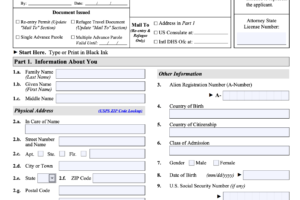How to find out if I have a deportation order

A deportation order in the United States is a serious situation and carries serious implications for anyone facing it. Below, we detail what a deportation order is, how you can find out if you have one, and what options exist for dealing with it.
What is a deportation order?
A deportation order is a judgment issued by U.S. immigration authorities that determines that a foreign national must be removed from the country. This mandate is issued by the U.S. Department of Homeland Security (DHS) after finding that an immigrant is not authorized to remain in the country, usually due to violations of immigration laws.
How do I know if I have a deportation order?
- Contact the Immigration Court: Through a FOIA (Freedom of Information Act) request to access your immigration records.
- By Phone: By calling 1 (800) 898-7180 and following the instructions to verify your status.
- Consult an Immigration Attorney: Especially if you have not interacted with USCIS or an immigration court.
Common reasons for receiving a deportation order
- Illegal entry into the United States or violation of conditions of stay.
- Committing criminal acts.
- Represent a threat to public safety.
Is it possible to remove a deportation order?
- Case Review: Depending on the specific circumstances of your case, an attorney can help determine if there are options to reverse the order.
- Appeal: There is a 30-day period from the issuance of the deportation order to appeal it using Form EOIR-26.
The importance of an immigration lawyer
In deportation cases, it is essential to seek legal advice to understand your rights and explore the defense options available. An experienced attorney can provide guidance and assistance in the process, helping to navigate the complexities of the U.S. immigration system.
What to do if you have a deportation order?
If you confirm that you have a deportation order, acting quickly and strategically is crucial:
- Urgent Legal Advice: Contact an immigration attorney immediately. A professional can provide you with a better understanding of your situation and develop a plan of action.
- Review Immigration Relief Options: Depending on your case, you may qualify for certain types of immigration relief, such as asylum, cancellation of removal or a U Visa for crime victims.
- Consider Appeal: If there are valid grounds, your attorney can help you file an appeal against the deportation order.
What happens if you do not attend your deportation hearing?
Failure to attend a deportation hearing can have serious and lasting consequences. In addition to the order of deportation in absentia, this action may result in:
- Difficulty Obtaining Immigration Relief in the Future: Losing the opportunity to file your case may negatively affect any future attempts to legalize your status in the U.S.
- Bar on Reentry: The order of deportation in absentia can lead to a ban on re-entry into the United States for several years.
It is essential to understand the importance of attending all scheduled hearings and to consult with an immigration attorney if you face difficulties in doing so.
Is it possible to obtain permanent residency through deportation defense?
In some cases, you may be eligible to apply for permanent residence as part of your defense against deportation.
This could include showing that your deportation would cause extreme hardship to a close family member who is a U.S. citizen or permanent resident.
Facing a deportation order is challenging, but there are legal avenues that can help you. The advice of a specialized attorney is indispensable to explore all your options and protect your rights in this complex and stressful process.






